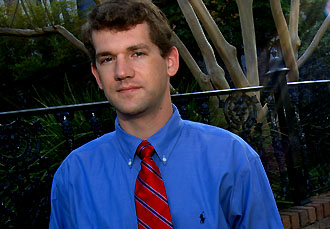Looking for Trends in Election Upset?
Politicians on both sides of the aisle are scrambling to spin the results of last Tuesday's (Jan. 19) special election to fill the seat of the late Sen. Ted Kennedy, but Tulane political scientist Brian Brox is cautious about finding a national trend in the upset.

"The talking heads very much want interpretation, even when interpretation really isn't warranted," says Brian Brox, assistant professor of political science. (Photo by Paula Burch-Celentano)
The Right is calling the upset victory by Republican Scott Brown a referendum on the Obama administration, while the Left insists it was the fault of Democratic candidate Martha Coakley, although acknowledging it as a "wake-up call."
The public, however, should be wary of any implications being asserted by the politicians in Washington or the national media, says Brox, assistant professor of political science.
"A lot of people want to read into the Massachussetts election something broader," Brox says. "But I would be cautious reading some kind of national trend into a single state election."
Brox says that both sides are attempting to spin the election and conjure up explanations without relying on hard data.
"There are a whole bunch of factors that went into this decision by the voters," Brox says. "We really don't know many of them because we don't have exit polling, so any kind of scholarly analysis is impossible."
While he argues that the data does not shed light on how voters will cast their ballots in future elections, Brox says the implications for the Democrats' legislative agenda are clear because that they no longer have a filibuster-proof super majority in the Senate.
"This really puts the healthcare legislation in a tough spot," says Brox. "They're left with a bunch of options that nobody really likes, and there's really no good way to get through this now."
While Democrats are mourning the loss of their super majority, Brox believes that this could benefit the public, which is largely centrist and not as divided as those in the halls of Congress.
"If the Democrats learn a lesson and it makes them able to negotiate with the conservative Democrats and a portion of the liberal side of the Republican party, then we'll get some better policy passed because of it."
